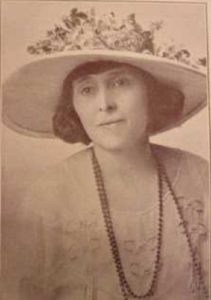
Nellie Francis
*Nellie Francis was born on this date in 1874. She was a Black suffragist, racial justice advocate, and activist.
Nellie F. Griswold was born in Nashville, Tennessee. Her parents were Maggie Seay and Thomas Garrison Griswold, and she had a sister, Lula Griswold Chapman, who died in 1925. Her grandmother was Nellie Seay, a house slave to Colonel Robert Allen, a Tennessee Congressman. Her aunt on her mother's side, Juno Frankie Pierce, was also a prominent suffragist and civil rights activist. Francis attended Knowles Street School, the first school in Nashville to employ Black teachers.
In 1883, her family moved to the Rondo district of Saint Paul, Minnesota. She was the only Black among 84 students graduating from her high school in Saint Paul in 1891. She gave a passionate talk at the high school's commencement titled "The Race Problem," winning second place for oratory. Francis was offered scholarships for a college and a drama school but took a stenography course. She began working as a stenographer at the Great Northern Railway in 1891 and later at Western Publishing Company.
In addition to her work and community activism, Francis enjoyed singing and acting, sometimes combining her enjoyment of performing with the causes to which she was committed. In 1892, The St. Paul Appeal newspaper reported that "several young ladies will conduct a mock trial, Misses Fannie Dodd and Nellie Griswold will act as lawyers. Everyone must see this, one of the most novel affairs of the season. This is pushing women's rights". As well as performing, she wrote and produced a play called "Magic Mirrors."
She met her husband, William T. Francis when they both worked for a railway company; they married in 1893. In 1914, she resigned to devote herself full-time to community work and civil rights activism, particularly women's suffrage, discrimination, and violence. When she and her lawyer husband, William T. Francis, bought a home in a white neighborhood, they were the targets of a Ku Klux Klan terror campaign. Francis called her husband, Billy.
They shared a commitment to gender, racial and social progress, and talent for singing and acting. They formed a strong partnership in life and politics and often performed together. The two issues for which she is best known are founding a Black suffragist group and anti-lynching activism. It was an intense time in both areas. After World War I, there was a sharp increase in lynching and the migration of Blacks from the southern to northern states.
In 1918, Francis led a resolution of her church, Pilgrim Baptist Church, against the lynching and burning of people that was delivered to the President of the United States. Also, that year, white suffragists in Minnesota rejected an amendment that secured women's suffrage in exchange for excluding Black women from the vote: Francis said, "keen would have been my disappointment if they had failed to make this sacrifice."
Although it would not come into force till 1920, the battle for women's vote in Minnesota was won in 1919. Francis founded and led the Everywoman Suffrage Club, a Black women’s suffragist group that helped win women the right to vote in Minnesota. She initiated, drafted, and lobbied for adopting a state anti-lynching bill signed into law in 1921. Francis' group then turned its attention to social progress on race, particularly for black women.
She was involved in national civil rights networks throughout her life, attending a dinner in honor of W.E.B. du Bois and visiting with Booker T. Washington's wife, Portia. She attended the 1916 National Republican Convention, where her husband was an elector, and she met President Harding in 1921. Among many activities, including fundraising for a pipe organ for her church, Francis was president of the Baptist Missionary Circle and secretary of the Tri-State Women's Baptist Convention. She also served as the president of the Minnesota State Federation of Colored Women's Clubs and the local NAACP chapter board and was active in the Republican Party.
She held shorthand classes in her home when Blacks could not enter business schools. The couple's celebration of their 25th wedding anniversary in 1918 included singing and was reported in local newspapers. Nellie's sister, Lula, and brother-in-law lived with them in St. Paul. In 1927, she moved to Monrovia, Liberia, with her husband when he was appointed U.S. envoy to Liberia. Two years later, he died from yellow fever in 1929. After her husband's death, she returned to Nashville. In 1930, the United States House of Representatives voted not to grant her the equivalent of a year of her husband's salary because it was not shown that she depended on him. However, in 1935, Congress approved the grant.
Around that time, Francis was living in Long Beach, California, after attending the 1932 Summer Olympics in Los Angeles. Nellie Francis died on December 13, 1969. She is buried with her husband in Nashville’s Greenwood Cemetery. She is one of 25 women honored for achieving women's right to vote in the Minnesota Woman Suffrage Memorial on the grounds of the State Capitol in St. Paul.